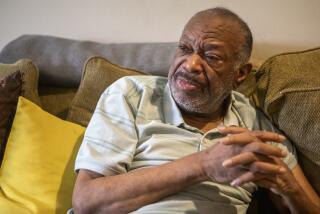Carl Rowan; Journalist, Diplomat, Commentator
- Share via
WASHINGTON — Carl Rowan, a prize-winning journalist and former diplomat who overcame the repression and racism of the deep South to become a leading voice for black America, died early Saturday. He was 75.
Rowan died of natural causes in the intensive care unit of Washington Hospital Center, said hospital spokesman LeRoy Tillman.
Although he served in the administrations of both John F. Kennedy and Lyndon B. Johnson in the 1960s, Rowan’s greatest prominence in the last three decades came as a journalist. He wrote a thrice-weekly column that was syndicated in newspapers around the country, penned best-selling books and was a regular television and radio commentator, hammering on what were often unpopular themes of race, class and inequality in the United States.
He was often described as among the nation’s leading black journalists, but Gordon Peterson, who hosts and produces the “Inside Washington” talk show, where Rowan was a fixture for nearly 30 years, said that label was too limiting.
“I’d take out ‘black’ and say he was just one of the most prominent journalists in America. He had a world view, and he took on a range of issues,” Peterson said in an interview. “He was a wonder, a remarkable man: He was tough, he was funny, he was courageous. He had a great integrity, and he was brutally honest.”
Sometimes too honest, recalled his son, Carl T. Rowan Jr.
When Rowan wrote columns in 1995 that helped expose corruption and financial mismanagement in the National Assn. for the Advancement of Colored People, earning a nod as finalist for the Pulitzer Prize, “a lot of people didn’t want him to write those articles and expose their dirty linen,” the younger Rowan said. “But he said, ‘I’m a journalist, and I have to write the stories that need to be told.’ ”
Indeed, Rowan kept on writing his column even as his health deteriorated over the last few years because of heart and kidney problems. He was in and out of the hospital in recent weeks with various ailments, his son said.
“He kept working to the end,” his son said. “. . . Aside from being a voice for people who didn’t really have a voice, he just flat-out loved his job.”
One of Rowan’s other great loves in recent years was Project Excellence, a nonprofit group he founded in 1987 that has provided tens of millions of dollars in scholarships to black teenagers in the Washington, D.C., area, where he lived most of his adult life.
The project, appropriately enough, grew out of a Rowan column looking at black students who were discouraged by their peers from doing well in school.
“To me nothing is more beautiful than a proud, sharp-minded teenager who is beautifully articulate and determined to achieve great things,” Rowan once wrote of the scholarship project. “This is doubly true if it is a black teenager whose words give wings to his or her dreams and substance to their belief that learning can liberate them from a millennium of bigotry and stereotypes.”
Rowan titled his 1991 autobiography “Breaking Barriers,” and his admirers said it was an apt description for how he lived his life.
Born Aug. 11, 1925, in Ravenscroft, Tenn., Rowan grew up in poverty during the Depression in a dying coal-mining town, where he mowed lawns to help his family get by. He was so poor, he once wrote, that he found food by sneaking onto farms and “sucking hot milk from the teats of a cow.”
Because he was black, he was forbidden to enter the town’s only library. Nonetheless, he was encouraged by his teachers and he became valedictorian of his high school class.
In 1942 he entered Tennessee State College, where teachers encouraged him to compete in a national exam to become one of the first 15 black Americans commissioned as Navy officers.
Rowan’s Navy duties ended in 1946 and he returned to college, this time at Oberlin in Ohio, from which he graduated with a degree in mathematics before deciding to go into journalism.
After earning a master’s degree in journalism at the University of Minnesota, he found work at the Minneapolis Tribune, becoming one of the few blacks working within the white-dominated establishment press. His reporting on race relations in the segregated South during the 1950s brought him fame and recognition, as well as close associations with such civil rights leaders as former NAACP General Secretary Roy Wilkins, Urban League President Whitney Young and Supreme Court Justice Thurgood Marshall, whose life he later chronicled in a biography called “Dream Makers, Dream Breakers.”
In 1961, seeking to integrate the all-white diplomatic corps, Kennedy appointed Rowan as deputy secretary of state. Later, Kennedy tapped him as a U.N. delegate during the Cuban missile crisis, and later as ambassador to Finland. During the Johnson administration, Rowan, as director of the United States Information Agency, became the first black American to sit in on Cabinet and National Security Council meetings.
He then returned to his first love, journalism, earning numerous awards over the years for his writing and television work.
One of the few blemishes in his career came in the late 1980s, when Rowan--despite his advocacy of strict gun control--was arrested for using an unregistered weapon to wound a teenage intruder in his backyard. Rowan said he was simply protecting himself, and the jury deadlocked.
Rowan is survived by his wife, Vivien, three children and four grandchildren. The family asked that any memorial donations be sent to Project Excellence at 3251-C Sutton Place NW, Washington, D.C. 20016.
More to Read
Sign up for Essential California
The most important California stories and recommendations in your inbox every morning.
You may occasionally receive promotional content from the Los Angeles Times.













